Jun 25, 2025 – Return to Korea, Religious Leaders’ Meeting, Weekly Dharma Assembly
Hello. Today, after completing his visit to Bhutan, Sunim returned to Korea and immediately attended a religious leaders’ meeting and Weekly Dharma Assembly.
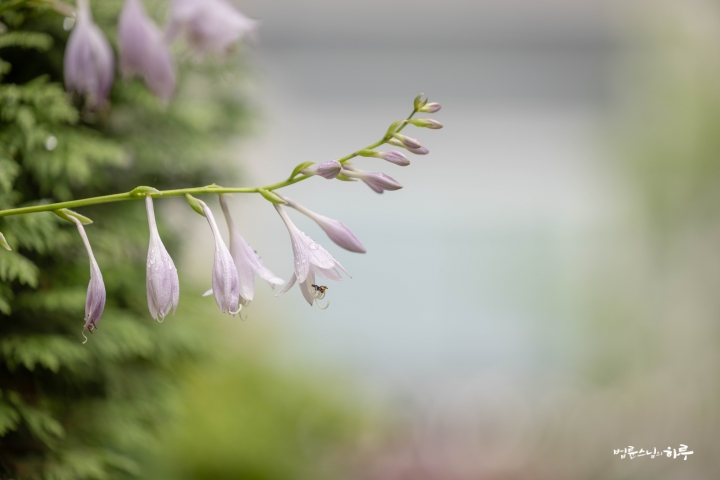
Sunim departed from Bangkok Airport at 11:10 PM last night and arrived at Incheon Airport at 6:40 AM after a 5-hour and 25-minute flight. He caught some sleep on the plane during the night.

After completing immigration procedures and leaving Incheon Airport, he headed straight to the Jungto Social and Cultural Center in Seoul. He received word that the religious leaders had already arrived at 7:30 AM and started their meeting.
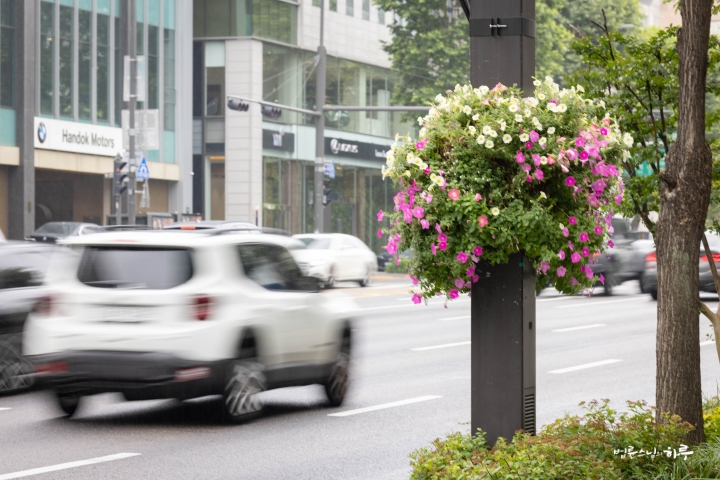
No matter how fast they went, it seemed Sunim would be late for the religious leaders’ meeting. Sunim arrived at the Peace Foundation conference room at 8:30 AM.
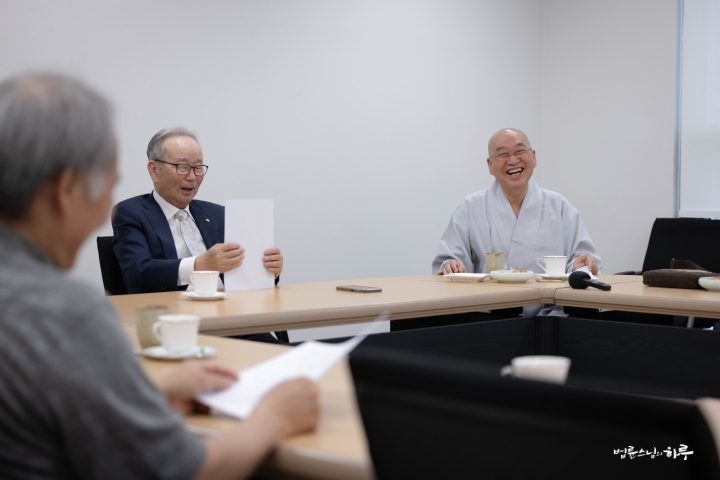
“I apologize for being late. When I booked my flight ticket, I miscalculated the date, so I had to change my ticket and take a later flight, which is why I arrived late.”
The pastors, priests, bishops, and religious teachers all welcomed Sunim.
“Thank you for your hard work traveling such a long distance.”
After asking for their understanding, they began their discussion. First, they shared and reviewed the detailed schedule for the International Reconciliation Conference and the Sri Lankan religious leaders’ invitation event scheduled from July 14 to 17.
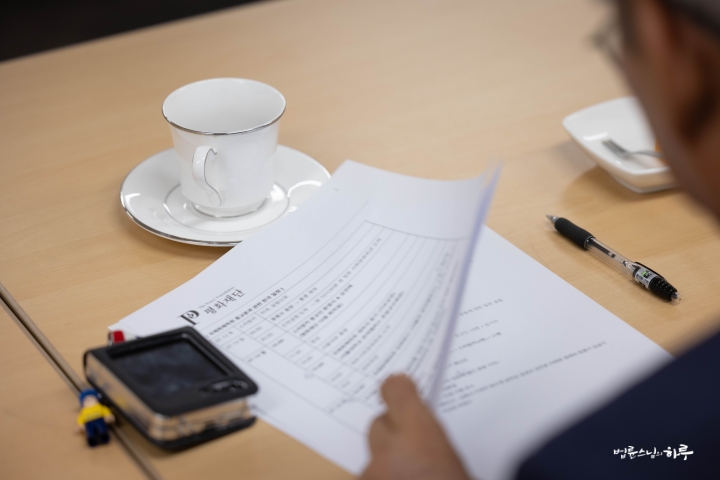
Sunim then shared about his visits to Laos, Washington D.C., Japan, and Bhutan over the past three weeks.
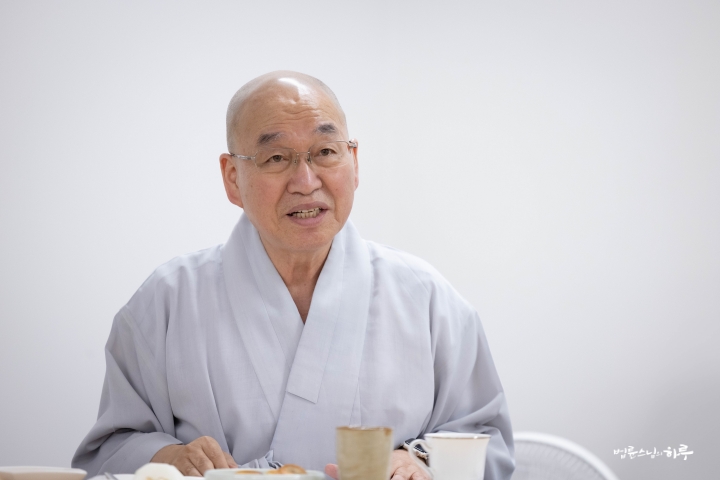
“Right after the 100-Day Dharma Talk ended, I visited the United States in mid-June to meet with relevant officials to try to restart the North Korea-US dialogue. North Korea doesn’t seem to be refusing dialogue with the US, but they don’t appear willing to take the initiative to engage in talks. I can speculate on two reasons for this: one is that they seem to want to see what cards the US will bring to the table before engaging in dialogue, and the other is that with the Ukraine-Russia war still unresolved, there are still matters to settle first, such as the issue of North Korean troops in Russia, before they can talk with the US. Regarding North Korea-Japan relations, Japan seems to place little significance on this as they simply follow whatever the US decides. If North Korea-US relations continue in this stalemate as they are now, there is a way to dramatically improve inter-Korean relations, but with North Korea having designated South Korea as a hostile state, it’s currently impossible to predict how North Korea will respond.
The Impact of Trump’s Iran Strike on North Korea-US Dialogue
Until now, I had taken the position that it would be better to resolve North Korea-US relations first and then work on inter-Korean relations. However, seeing President Trump attack Iran’s nuclear facilities a few days ago, I don’t think North Korea-US relations will be easily resolved. From North Korea’s perspective, they might be thinking, ‘How can we trust someone like Trump?’ In this situation, while it’s difficult to restore inter-Korean relations to their previous state, I think it might be better to at least try to end the hostile relationship first. If there hadn’t been a change of government in South Korea, former President Yoon Suk-yeol might have taken it upon himself to play a role like Netanyahu, similar to Israel. It’s very fortunate that such danger has been eliminated with the new government. As it happens, when the Lee Jae-myung government stopped loudspeaker broadcasts to North Korea, North Korea also stopped its noise broadcasts to the South, further easing tensions between the two Koreas.
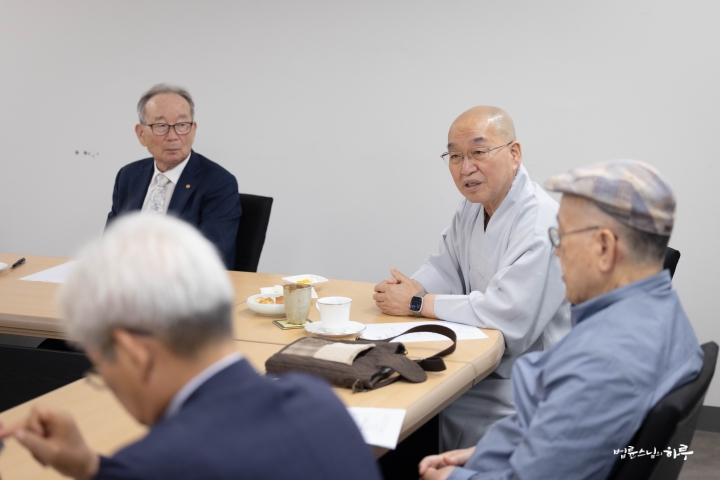
I also went to Japan and met with senior politicians. Japan has House of Councillors elections in July, so the government might change again. Therefore, Japan doesn’t seem ready to actively engage in North Korea-Japan dialogue at present.
Last week, I visited Bhutan and signed a Memorandum of Understanding (MOU) with the Bhutanese government for this project to proceed with sustainable development.”
After hearing about Sunim’s schedule, Bishop Park Kyung-jo said:
“You’re overworking yourself too much. We should pass a resolution today to prevent Sunim from taking any more flights.” (Laughter)
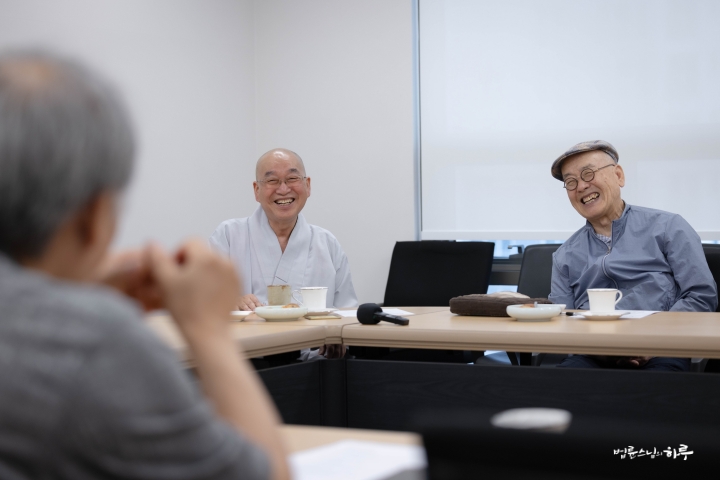
The religious leaders continued their discussion in earnest about how to improve North Korea-US relations and inter-Korean relations. Pastor Park Jong-hwa responded to Sunim’s remarks:
“Iran hasn’t actually made nuclear weapons. They’ve secured nuclear weapon manufacturing technology. However, North Korea has already manufactured nuclear weapons. So the situations of Iran and North Korea are somewhat different.”
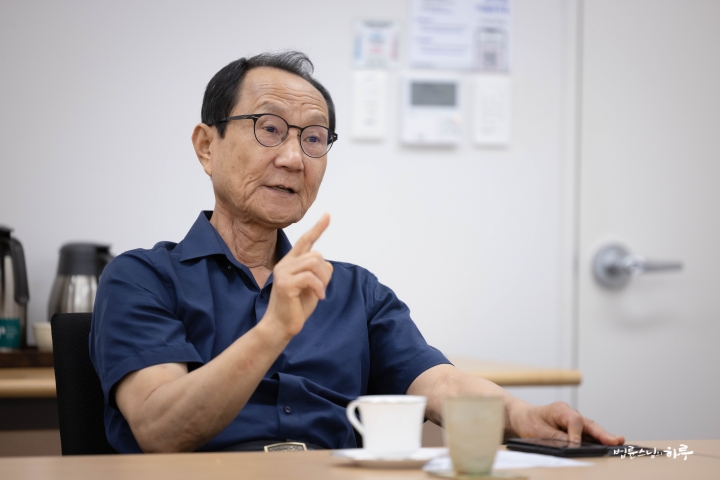
Sunim agreed with the pastor’s words and said:
“Iran has cooperative relations with China and Russia, but not to the extent of military alliances. However, North Korea has not only developed nuclear weapons but also borders China and has even formed a military alliance with Russia. That’s why the United States won’t be able to attack North Korea like it did Iran. Someone like Netanyahu could come to power in South Korea and escalate the risk of war, but with the new government in place, we can say that such danger has been eliminated.”
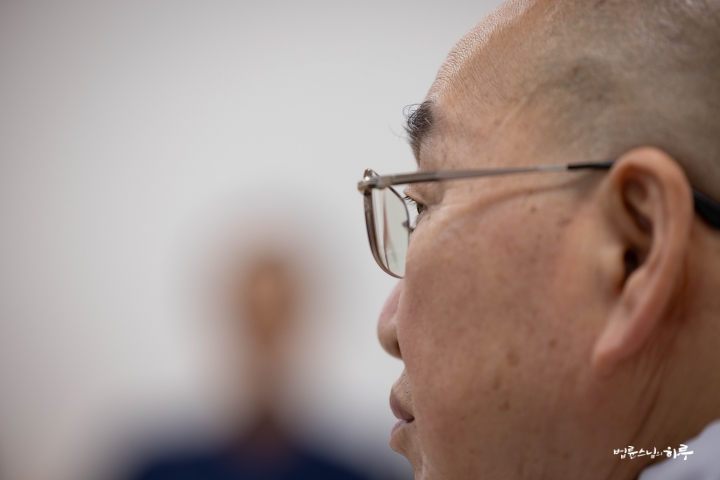
Father Kim Hong-jin said with a smile:
“It seems former President Yoon Suk-yeol made a great contribution by declaring the December 3rd emergency martial law. What do you call such a person in Buddhism?”
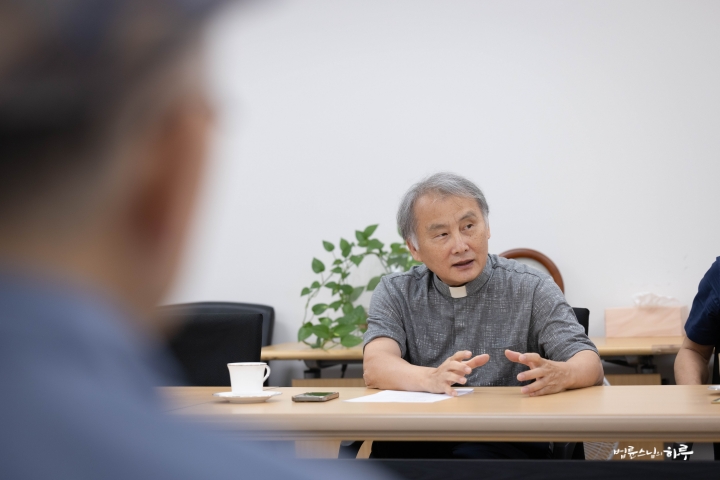
Sunim answered:
“In Buddhism, we call someone who awakens people by making themselves appear bad a ‘reverse bodhisattva.’ It’s actually easier to awaken people through virtuous actions, but choosing to become a bad person is extremely difficult.”
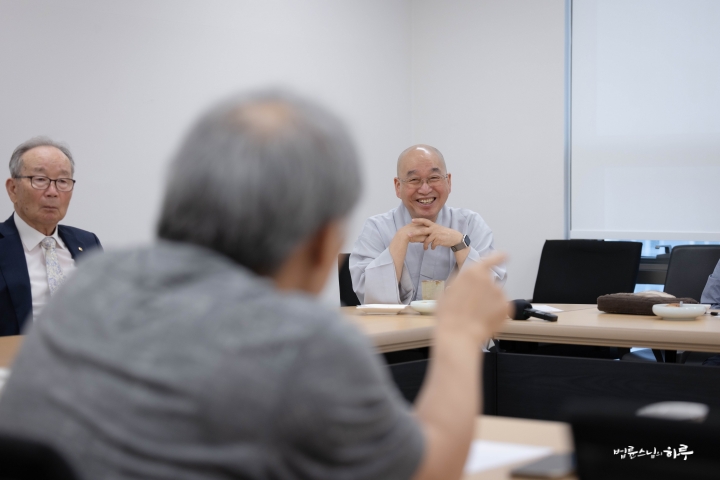
The Archbishop also said with a smile:
“That’s something neither pastors nor bishops could ever imitate.” (Laughter)
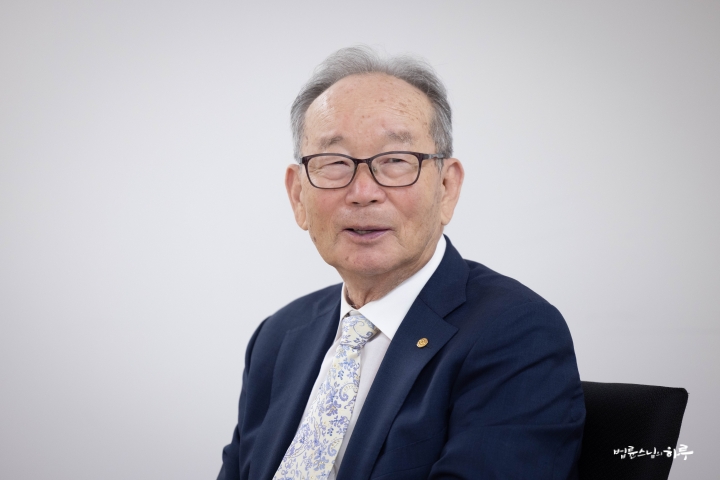
As the conversation deepened, Bishop Park Kyung-jo asked:
“As we talk, I wonder what role religion should play in these times. The wave of capitalism is becoming stronger, and we’re living in a world where speaking about the teachings of Jesus or Buddha doesn’t seem to resonate anymore.”
Sunim answered:
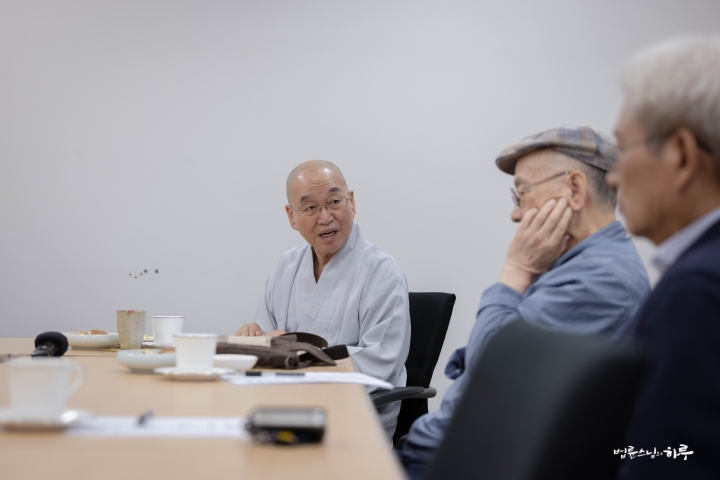
“In capitalist society, the only monotheistic religion is the religion of money. Christianity, Catholicism, and Buddhism have set up shops under this money religion. Each one lures people by saying ‘Come to us and you’ll make more money’ – that’s what religion is today. Even within Buddhism, temples claim that praying at their particular temple will make you richer, so fundamentally it’s all about the money religion. No matter how much we try to share good teachings with people, if someone downstairs is lecturing about ‘which stocks will make you rich,’ everyone will flock downstairs. The shamans who are controversial these days are ultimately connected to helping people make more money and get promoted.”
As they conversed, laughter bloomed. They agreed to meet again at the International Reconciliation Conference in July and concluded the gathering.
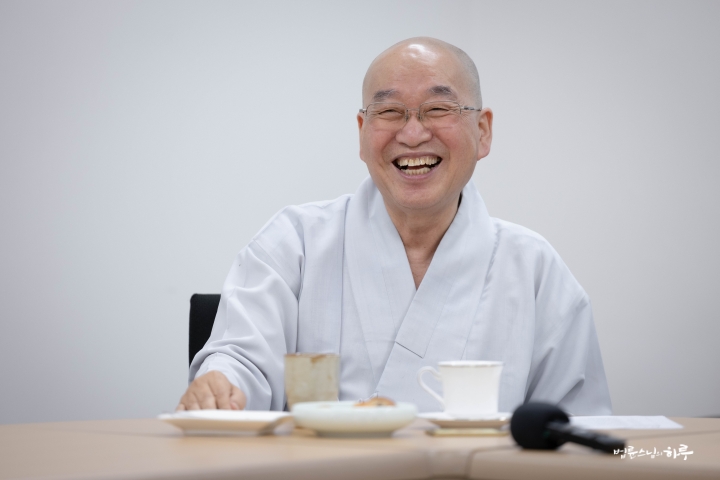
After seeing off the religious leaders, Sunim immediately moved to the Dharma Hall on the third floor. At 10 AM, the Weekly Dharma Assembly began with the recitation of the Three Refuges and the Heart Sutra. Jungto Society members also participated online by joining the video conference.
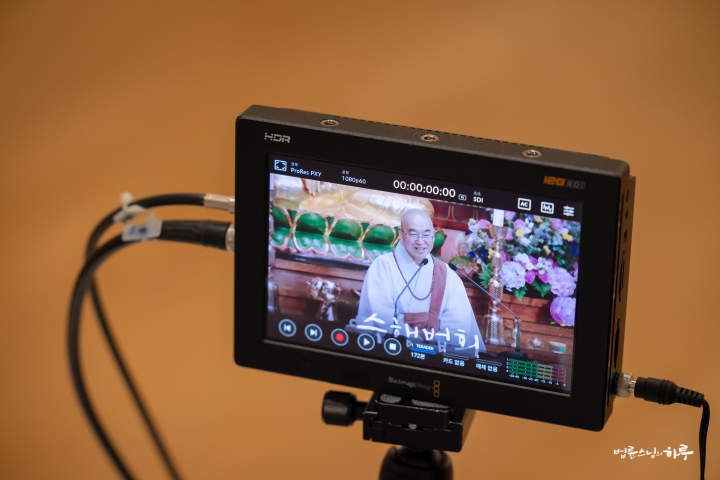
After watching the weekly Jungto practitioner news and a video of Sunim’s visit to Bhutan, the assembly requested a Dharma talk from Sunim with three prostrations.
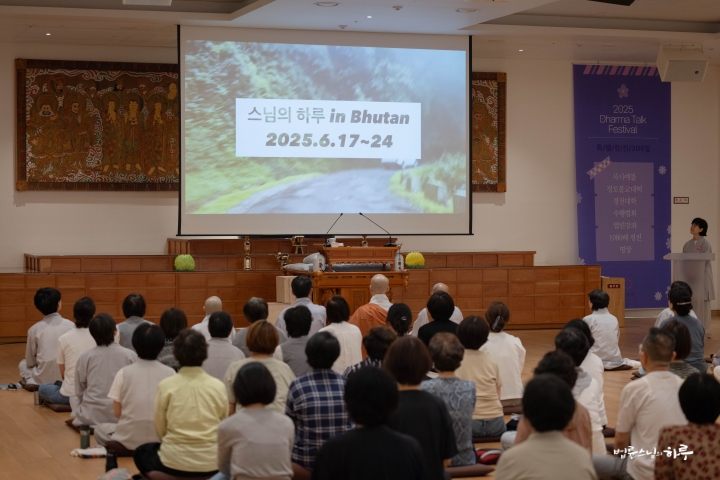
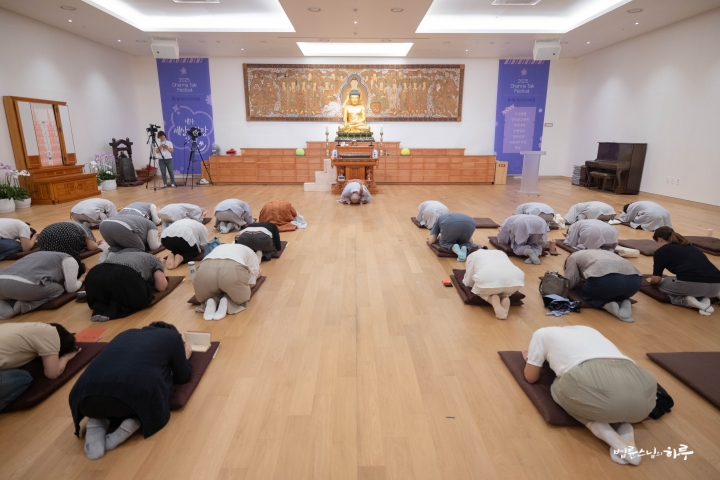
Sunim shared detailed news about his visit to Bhutan and emphasized that practitioners should live a life of “seeking enlightenment above, saving sentient beings below.”
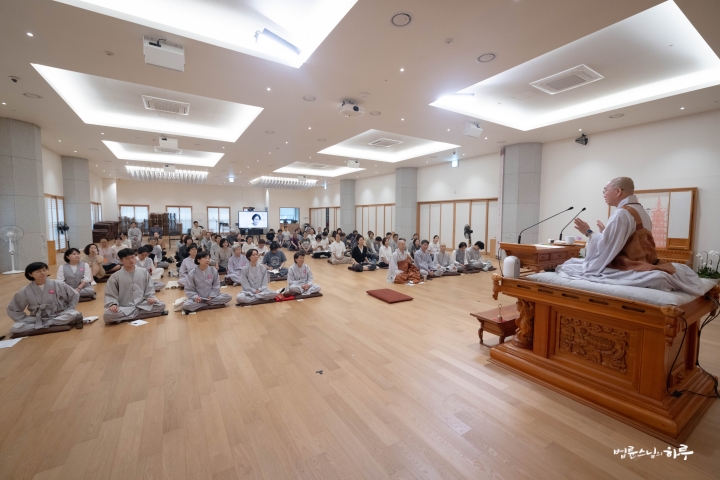
“Jungto practitioners should practice for one hour every morning for themselves, attend the Weekly Dharma Assembly once a week to engrave the Buddha’s teachings in their hearts, and participate in volunteer work for at least two hours a week. Additionally, they should participate in ‘Meditation Retreat,’ ‘Awakening Retreat,’ or ‘Sharing Retreat’ at least once a year to purify their minds. Even though we live in the secular world, this is how we should live as practitioners.
However, living in reality, it’s easy to skip morning practice, miss weekly Dharma assemblies, and find it difficult to participate in annual retreats. As a result, rather than living freely without suffering according to the Buddha’s teachings, we become blinded by greed and unable to control our temper, living with suffering. While claiming to be Buddhist practitioners in words, many remain practitioners in name only.
How Jungto Practitioners Can Practice in Daily Life
Jungto Society is a community of practitioners. Jungto practitioners should start their day with practice when they open their eyes in the morning, and no matter how busy they are, they should participate in the Weekly Dharma Assembly to realign their scattered minds. We also hold Jeongil-sa (Builders of Jungto) retreats once each in the first and second half of the year. The Jeongil-sa retreat involves 300 prostrations daily for two weeks, followed by a week of sharing with fellow practitioners to examine our shortcomings and use them as tasks for continued practice. Even if imperfect, steadily cultivating oneself in this way is practice. This year, Jungto Society successfully completed the 100-Day Dharma Talk from February 16 to June 1, with 105 consecutive days of Dharma talks, practice, and volunteer work. Although the 100-Day Dharma Talk has ended, practice continues as we’ve designated 300 days this year as a special intensive practice period.
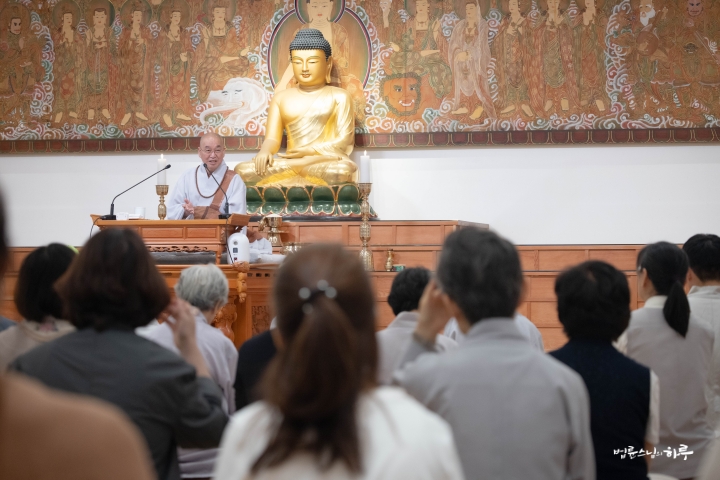
Today, many Korean Buddhists call themselves Buddhist practitioners, yet they often find practice difficult because they don’t engage in diligent practice regularly. However, even Muslims pray five times a day and faithfully observe Ramadan, fasting during daylight hours for an entire month each year. The original teaching of Buddhism lies in practice and dedication. However, as Buddhism became institutionalized throughout history, its original meaning became obscured, and it devolved into a secular faith focused merely on praying for blessings.
As a result, the reality today is that while the name of practice remains in Buddhism, there are few who actually practice. Many who claim to believe in Buddhism remain at the level of praying for blessings or simply studying Buddhism. Even when studying Buddhist doctrine or philosophy, this study doesn’t lead to practice that liberates one from suffering and leads to a life of freedom. Since everyone has freedom of religion, individuals may pray for blessings personally. However, when we gather under the name of Jungto Society, we must clarify our identity as practitioners.
The Life of a Practitioner: From Seeking Enlightenment Above to Saving Sentient Beings Below
Furthermore, we are bodhisattvas, Mahayana practitioners. We must practice not only the teaching of seeking enlightenment above (上求菩提) – awakening from our own ignorance and moving toward liberation and nirvana – but also the teaching of saving sentient beings below (下化衆生) – relieving the suffering of those around us. This is why Jungto Society consistently engages in social practices to help those who are struggling mentally and materially.
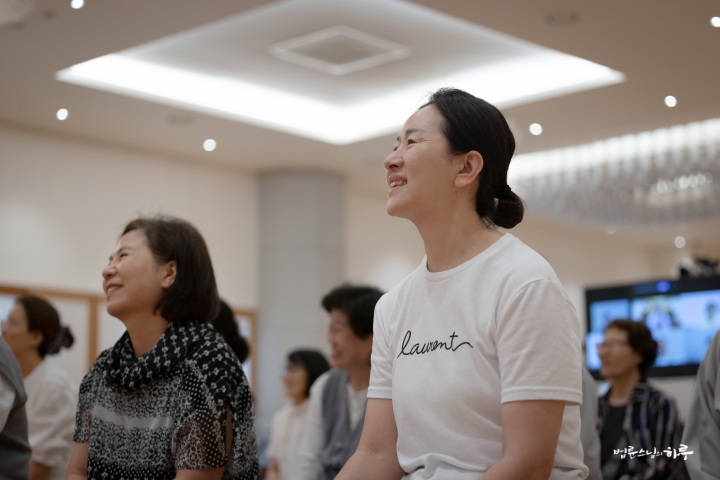
During the past hundred days, I primarily gave Dharma talks as part of the path of seeking enlightenment above (上求菩提), but as soon as the 100-Day Dharma Talk ended, I embarked on the path of saving sentient beings below (下化衆生). First, I have continued peace activities by traveling to various parts of the world. Since there is a danger that the Korean Peninsula could be engulfed in war like the Middle East situation, I have played a role in preventing that danger and preserving peace. I met with North Korea experts for dialogue, went to the United States to persuade them to open channels for North Korea-US dialogue, and in Japan, I encouraged the resumption of North Korea-Japan talks. Within Korea, I engaged in activities urging officials of the newly launched government to abandon hostile policies even if they cannot immediately improve inter-Korean relations.
Over the past week, I visited Bhutan and conducted workshops with government officials. Currently in Bhutan, we are visiting poor villages to help those without homes build houses and support repairs for dilapidated homes that need fixing. We are paving village roads, installing fences to keep out wild animals, creating irrigation channels to supply water to rice paddies, and installing water systems to provide running water to each household. Additionally, we are cementing sections of unpaved roads that were too steep or became muddy and impassable for vehicles during rain, so that cars can now travel on them, albeit bumpily. This community improvement movement that reduces residents’ inconveniences and alleviates their suffering can truly be called the highest offering to the Buddha. That’s why I told the Bhutanese officials:
‘Buddhist work is not just about building large temples or creating grand Buddha statues. True Buddhist work is alleviating the suffering of sentient beings in pain. You are no longer simply township heads, county magistrates, or county office employees – you are bodhisattvas who relieve the suffering of residents. Let us work together on this with the spirit of doing Buddhist work.’
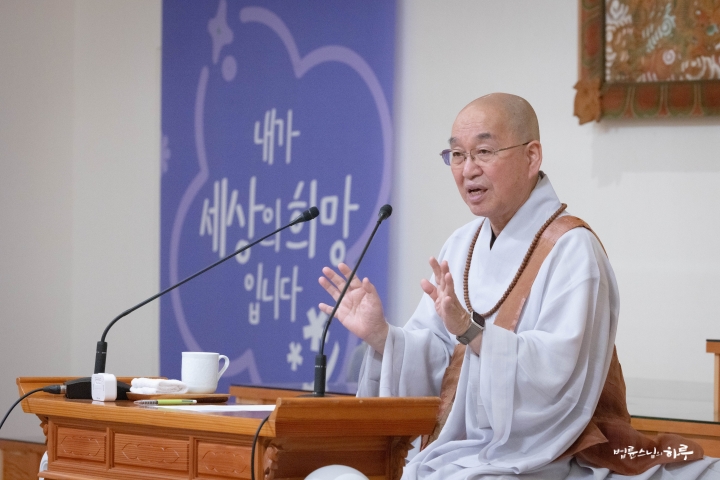
I placed prayer beads around the neck of each government official and said, “From today, you are all bodhisattvas who alleviate the suffering of sentient beings.” A bodhisattva should not complain or express dissatisfaction. I encouraged them to overcome any difficulties and work together to bring smiles to the residents’ faces.
Over the past year, a pilot project was conducted, and based on that foundation, an official MOU was signed with the Bhutanese government just the day before yesterday. Now the main project is beginning. Currently, four JTS volunteers are working in Bhutan, but there is a severe shortage of personnel. Therefore, the participation of more volunteers is urgently needed. While Bhutanese residents can build new houses themselves, the most challenging task is repairing existing homes. Until now, entire families have been living in one room – children, parents, and grandparents all sharing the same space. JTS aims to improve this situation by installing partitions in each house to create separate rooms for grandparents, children, and couples.
This movement is not about living luxuriously. It’s simply about improving any inconveniences one might experience when staying overnight in these homes. Wouldn’t it be uncomfortable to share a sleeping space without even a palm-sized private area? Wouldn’t it be inconvenient if there’s no toilet when you need to use one at night? Wouldn’t it be difficult if there’s no water to wash your face in the morning, or if the kitchen is too dirty when you want to eat? These are the issues we aim to improve. It’s not about living particularly well.
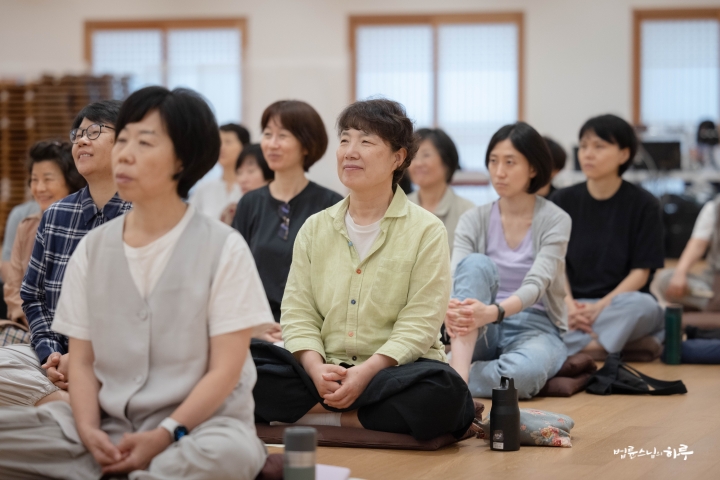
In fact, residents also shared their concerns, saying that even when their children come home from school dormitories, they don’t want to stay at home. This is why it was explained that houses need to be made cleaner and more convenient, and it was emphasized that this work must be done by the residents themselves – no one can do it for them. Therefore, sample houses need to be built in each village so that residents can see and reference them. The areas where this project is being implemented consist of two states, which contain about 65 townships, and under those are typically 3 to 4 natural villages each, totaling over 200 villages. Even if just one sample is made per village, this means more than 200 houses need to be renovated.
To implement this work, teams need to be formed with three or four skilled workers each – carpenters, plasterers, electricians, etc. – and one team needs to be sent to each of the 200 villages to carry out the work. Each house needs to have a sink installed in the kitchen and shelves built. Currently, people are living with their clothes and blankets wrapped in bundles and placed in a corner of the room. Therefore, it’s necessary to install shelves or storage units so they can organize their belongings. Kitchens also lack cupboards for dishes, making them constantly cluttered, so even simple storage spaces would help organize the homes considerably. The improvements that women appreciate most are: first, creating kitchens where they can work while standing; second, bringing kitchens indoors; and third, bringing water indoors. Since all of us, including myself, were born from our mothers’ wombs and raised on their milk, we should work to make life even slightly more convenient for women.
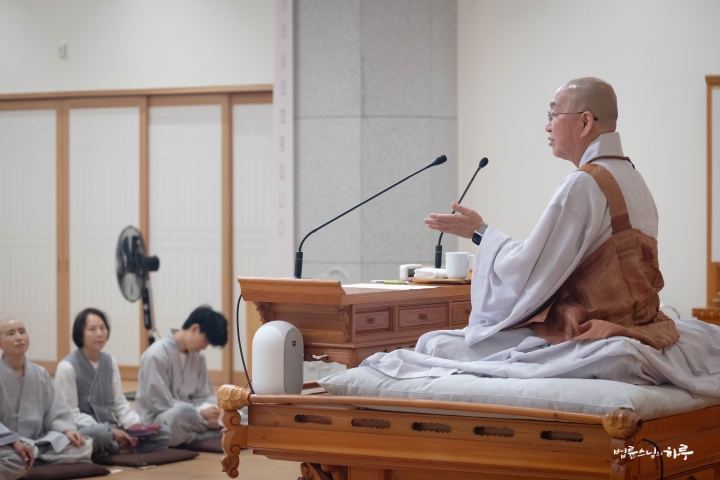
Female Lay Practitioners Hammering Nails, Practitioners Building Shelves, Now Is the Time When Human Hands Are Needed
To make these improvements, we need many volunteers. To volunteer, you need to have some technical skills. However, while older people have the skills, they find it difficult to adapt to the local food and climate, and they face language barriers with the residents. On the other hand, young people can communicate and adapt well, but they lack technical skills. Nevertheless, I think it would be good if young people could spare about a month to participate in volunteer work. These days, even building shelves is done with electricity, not manual labor. Planing is done with electric tools, and cutting wood is done with electric saws. The advantage of Bhutan is that electricity is available even in the most remote rural areas. This makes it very convenient to use electric tools. Since Bhutan produces enough hydroelectric power to export electricity to foreign countries, electricity is available everywhere, making the work much easier. In this respect, Bhutan has a great advantage.
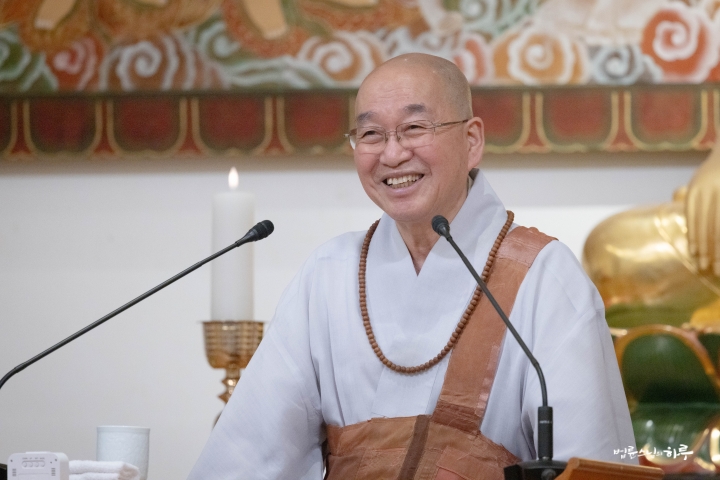
If we were to designate one center and work only there, we would only need to prepare accommodation facilities for volunteers in one place. However, this project is different because we need to go into villages deep in the mountains and stay for two weeks at a time to work. We can’t build new houses just to stay for two weeks. So we have to live in the homes of local residents, which means living conditions in Bhutan are quite poor. I hope many people will understand this situation and apply for volunteer work. You don’t need exceptional skills to volunteer. Anyone can do this work after learning how to plane, cut wood, hammer nails, and build shelves for about a week.
The foundation for creating a new model of sustainable development in Bhutan has now been established. However, as we expand to the main project and carry out improvement work in all villages simultaneously, there is quite a lot of work to do. We need to go through administrative procedures, prepare estimates, and visit each site to provide technical guidance. We also need to purchase materials in bulk. This is the work of helping sentient beings (下化衆生). In Mahayana Buddhism, both seeking enlightenment for oneself (上求菩提) and helping others (下化衆生) are forms of practice.”
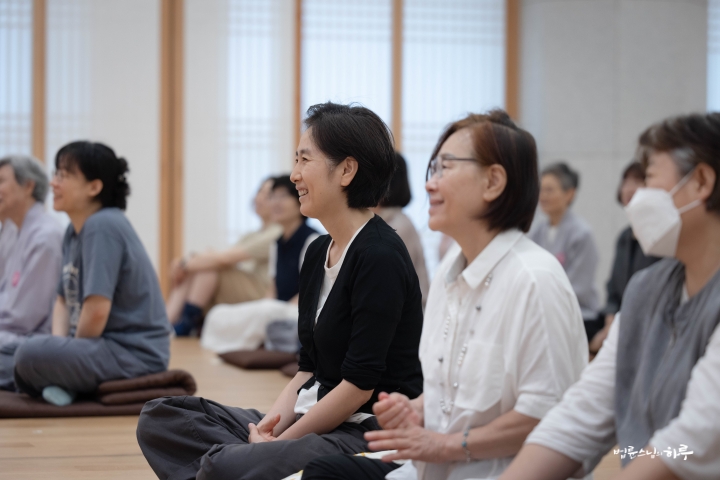
Next, Sunim received questions from those who had applied in advance. Today, two people asked questions online and had conversations with Sunim before concluding the assembly. The Weekly Dharma Assembly ended with the Four Great Vows after 11:30.
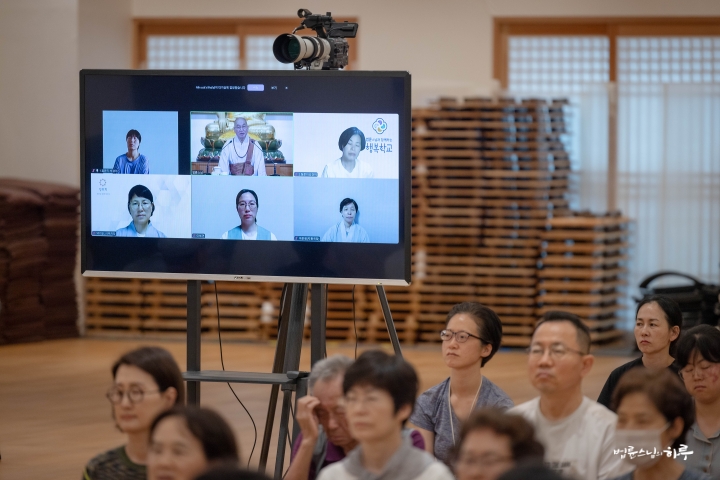
Sunim immediately moved to the reception room and held a meeting with JTS President Park Gina, who had returned from relief activities at the Myanmar earthquake disaster site.
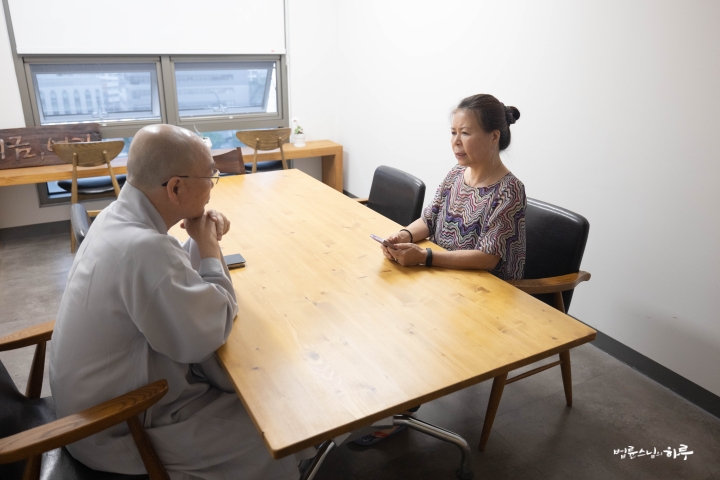
“How was your trip to Myanmar?”
“The Mandalay region in Myanmar suffered the most damage, so we distributed daily necessities to the disaster victims. We completed distribution to 1,067 households among those living in refugee camps with collapsed homes. Each household received a package containing 24kg of rice, 5kg of chickpeas, 1 liter of soybean oil, 180g of green tea, 1 pack (400g) of chicken seasoning, 1 pack (400g) of salt, and 1 box of 30 instant noodles. We plan to return to Myanmar in July to distribute to over 4,000 additional households.”
“Thank you for your hard work.”
After the meeting, Sunim took a brief rest in the afternoon. After recovering from the fatigue accumulated from flying all night, he headed to The Peace Foundation.
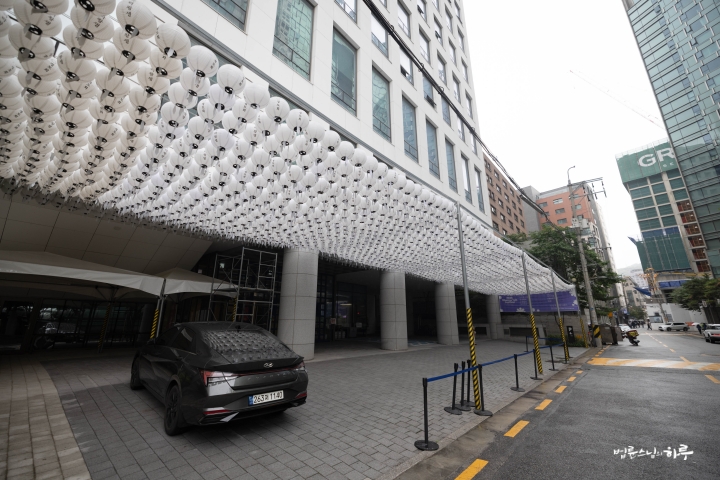
From 4 PM, Sunim attended The Peace Foundation Planning Committee meeting to discuss how to navigate inter-Korean and US-North Korea relations amid changes in the international order following the US airstrikes on Iran, and reviewed the foundation’s business direction.
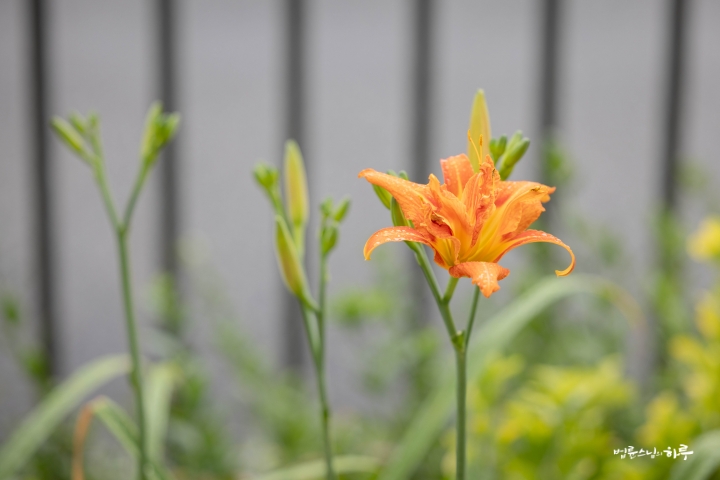
After sunset, at 7:30 PM, Sunim conducted a live broadcast of the evening Weekly Dharma Assembly. About 80 people gathered in the third-floor Dharma Hall, while Jungto Society members connected through online video conferencing and requested a Dharma talk from Sunim with three prostrations.
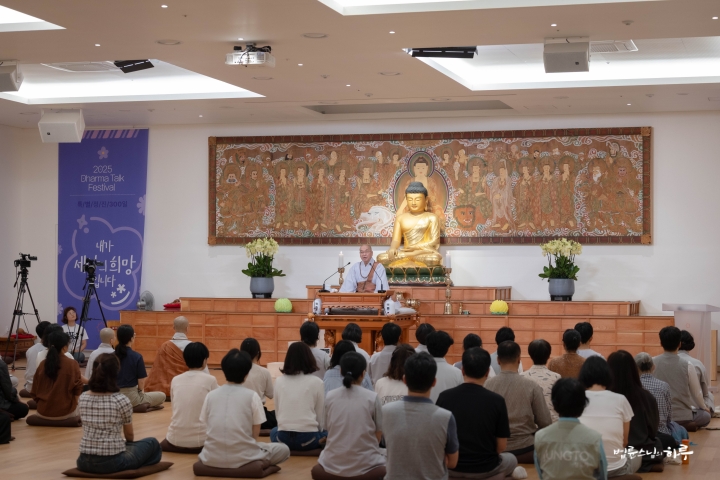
Like the morning assembly, Sunim shared about his visit to Bhutan. Following this, four people asked questions online and had conversations with Sunim. One of them had been working in the sales department at their company for a year but was struggling because despite their efforts, they weren’t seeing results, and sought Sunim’s advice.
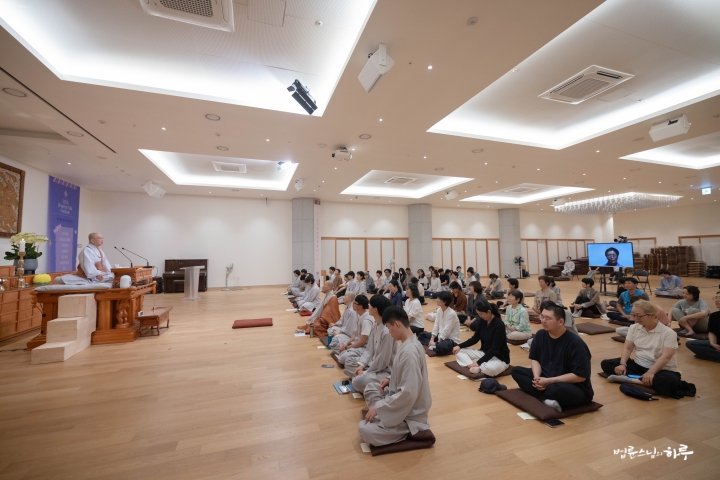
I Work Hard but Don’t See Results, and It’s Exhausting
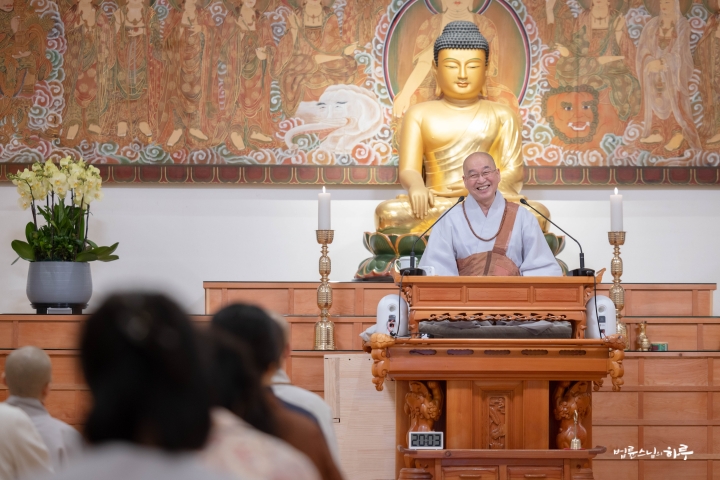
“There’s a contradiction in what you’re saying. If you want to feel at ease while also achieving results, that’s greed. Some people run well without much practice thanks to their natural talent, while others struggle no matter how hard they try. Some people can sing a song well after hearing it just once or twice, while someone like me can’t do it even after hearing it 500 times.
People have different talents. Just because you’re diligent doesn’t necessarily mean it will lead to results. Of course, being diligent is better than not being diligent, but being diligent doesn’t guarantee you’ll do better than others. When it comes to drawing, for example, while there’s a possibility of improvement, drawing for 10 hours a day doesn’t guarantee you’ll be 10 times better than a friend who draws for just 1 hour. You might even be worse than a friend who draws while playing around.
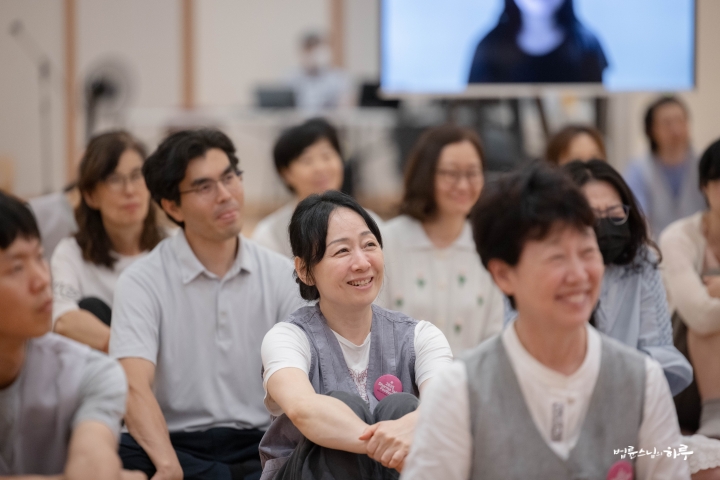
When comparing your diligent times with your non-diligent times, naturally the diligent times are better. But when comparing with others, you can’t judge based on diligence alone. This is because people have different innate talents. Someone with a special talent for sales might sell ten times more than others in the same amount of time. Also, when shopping, some people are good at bargaining. While I struggle to get even a 10 percent discount, some people can get half off. This shows how people have different talents. Even in the same school, some excel at English, others at math, and others at science. But is it all because they work hard? When we look at one person and compare when they work hard versus when they don’t, the results are better when they work hard. However, when comparing with others, innate talent sometimes makes a bigger difference than effort.
Your comparison standard is wrong right now. Among those who are good at sales, there are people who don’t work much but still produce good results. If you don’t have a talent for sales, no matter how hard you work, you might not do as well as them. In that case, you shouldn’t set a goal to do better than them. What’s important is ‘how much can I do at my level?’ If you do your best and research methods, you’ll improve somewhat, and if you’re lazy, your performance will be low. But if your efficiency is lower than others despite all your efforts, this job might not be suitable for you. I’m not saying you lack talent, but rather that you might not be suited for this field.
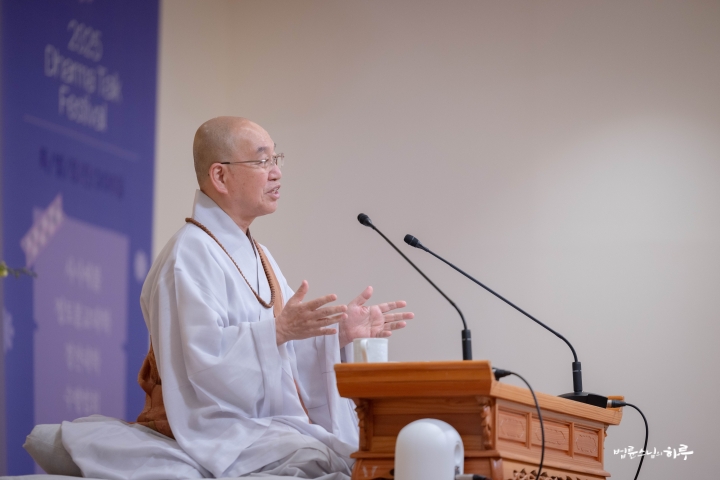
I have no talent for singing. It’s just singing that I’m not good at – everything else is fine. For example, when I was in school and took monthly exams, I was among the top students. But when year-end exams came around, my grades would drop significantly. Why was that? It was because subjects like art, music, and physical education were included in the average, bringing my overall score down. If you excluded those subjects, my grades were actually quite good. That was my ability and my reality. You’ve only been at your job for a year. Work for a few more years, practice, and observe how talented people do their work.
Even if you lack natural talent, there are ways to compensate through effort. If you can reach about 70 percent of what skilled people achieve through hard work, then it’s fine to continue with that job. However, if despite your best efforts you can only achieve about half of what others around you accomplish, then that work might not be suitable for you, and finding something else could be an option.
This isn’t something to agonize over. The question “Won’t I see results if I work hard?” isn’t quite right either. While working hard is important, you also need to consider whether the work suits your aptitude. You can’t ignore this and just adopt an attitude of working hard no matter what. Working hard doesn’t guarantee success. Results can vary depending on given conditions and circumstances. In Buddhism, we call this the law of cause, condition, and effect (因緣果報).
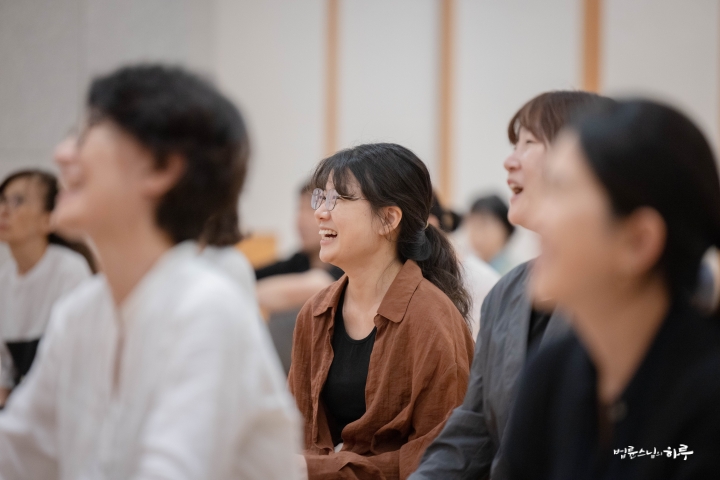
If you lack talent in this field, no matter how hard you work, your results may be less than expected. But that’s okay. It’s fine even if you achieve only half of what others do. If you accomplished 50 this month, aim for 60 next month, then 70 the month after. Don’t compare yourself to those who excel; instead, think, ‘I’m working hard and gradually improving.’ That’s the right perspective.
The root of your suffering is greed. Without recognizing that you’re being greedy, you compare yourself to others and suffer, thinking, ‘Why can I only do this much?’ All you need to do is let go of that greed. Letting go of greed doesn’t mean doing nothing. It means releasing the desire to outperform others and to achieve results beyond your abilities. You should pursue results that match your effort, talent, and given circumstances.”
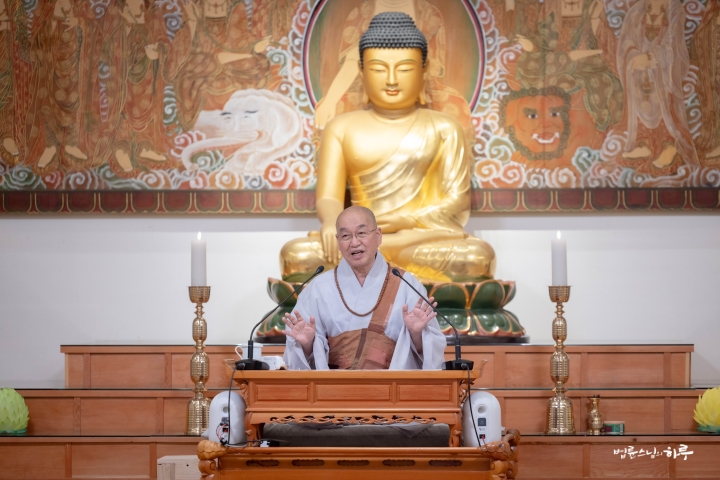
“I had been thinking that nothing would work out anyway, so I wasn’t properly dedicating myself to practice. But now I feel I should start taking my practice seriously from tomorrow. Thank you.”
Questions continued one after another. The entire audience gave a big round of applause to those who courageously asked honest questions.
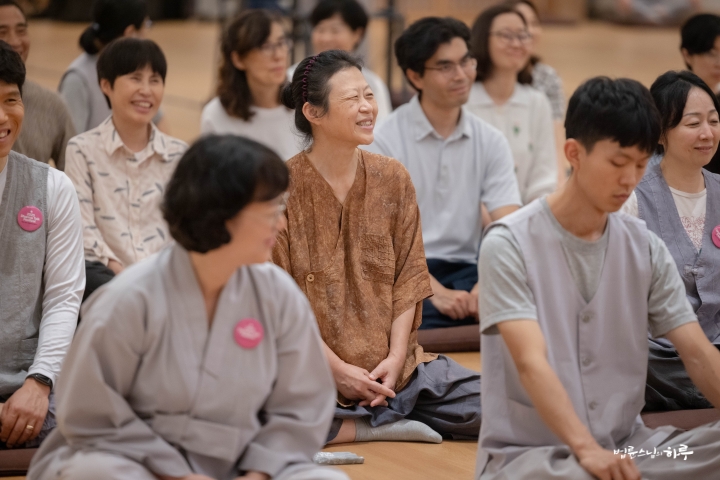
By the time the dialogue ended, it was well past 9 PM. The members sat in circles by group for mindful sharing, while Sunim left the Dharma Hall and headed to the Jungto Center.
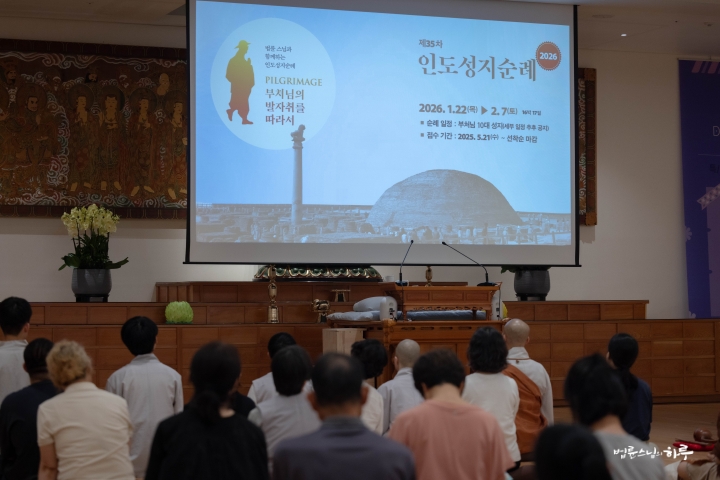
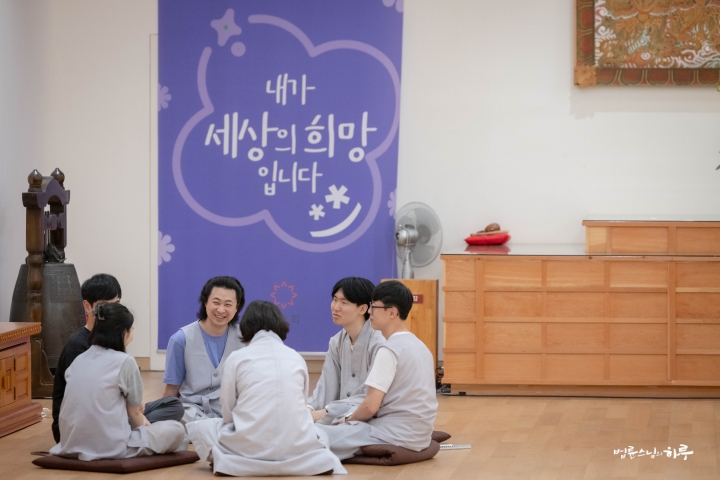
Tomorrow morning, Sunim will meet with North Korea experts. In the afternoon, he will attend the Peace Foundation’s regular symposium, followed by a welcome ceremony for the INEB Jungto Society delegation from Southeast Asia. In the evening, he will have a dialogue session with the INEB Jungto Society delegation.





